Missing
"We loll on top of the deeper currents and look out for the slow, heavy rise as it swells towards us. Years later, in nightclubs, I feel the strobe-lit smoky darkness around me as I move, and I feel as if I am dancing in surf.
The ocean flings up magic. Early mornings we comb the beach for treasure, and year after year, the treasures build up the sea myth Nautilus shells, perfect white wafer mobile homes for sea creatures … fossils … evil bounty: bluebottles, jellyfish." - Joanna Murray-Smith
The ocean flings up magic. Early mornings we comb the beach for treasure, and year after year, the treasures build up the sea myth Nautilus shells, perfect white wafer mobile homes for sea creatures … fossils … evil bounty: bluebottles, jellyfish." - Joanna Murray-Smith
I’ve been thinking a great deal about what I’ll miss and what I’ll gain from moving to England. I know there is a huge amount of space for the good things, and I know they’re coming; in fact, they’re here now: so what I’ll do for now is write about what I’ll miss.
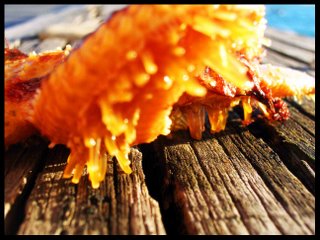 I’ve realised what is deeply unsettling for me is how distant I will become, ironically, much further separated from the ocean than I’ve been before. How funny to be thinking this when I am moving to an island of smaller proportions than my home, where geographically the ocean is closer, easier to reach than it seems here sometimes. Throughout my life, I’ve lived on or near coast, and somehow the British coast doesn’t really seem to cut it like Australian coast does, even though it’s no doubt more accessible and closer, geographically. There’s not as much space between the cities and their beaches. I just don’t know if they’re my kind of beaches.
I’ve realised what is deeply unsettling for me is how distant I will become, ironically, much further separated from the ocean than I’ve been before. How funny to be thinking this when I am moving to an island of smaller proportions than my home, where geographically the ocean is closer, easier to reach than it seems here sometimes. Throughout my life, I’ve lived on or near coast, and somehow the British coast doesn’t really seem to cut it like Australian coast does, even though it’s no doubt more accessible and closer, geographically. There’s not as much space between the cities and their beaches. I just don’t know if they’re my kind of beaches.
Growing up in Australia, all roads lead to the ocean, to the beach, to sand, yellow and hot and gritty in uncomfortable places; to the gentle wish-wash of waves curling over pink-white toes, albino-worm-like from their shelter in shoes for too long.
Moving to Melbourne was very unsettling in this respect. When you grow up defining home in a way that includes a physical and geographical orientation towards the ocean, it's difficult to adjust to a new place that meets so many of your other needs, but not those two. Melbourne does not lead to the beach. It is about other things.
 I’ve realised what is deeply unsettling for me is how distant I will become, ironically, much further separated from the ocean than I’ve been before. How funny to be thinking this when I am moving to an island of smaller proportions than my home, where geographically the ocean is closer, easier to reach than it seems here sometimes. Throughout my life, I’ve lived on or near coast, and somehow the British coast doesn’t really seem to cut it like Australian coast does, even though it’s no doubt more accessible and closer, geographically. There’s not as much space between the cities and their beaches. I just don’t know if they’re my kind of beaches.
I’ve realised what is deeply unsettling for me is how distant I will become, ironically, much further separated from the ocean than I’ve been before. How funny to be thinking this when I am moving to an island of smaller proportions than my home, where geographically the ocean is closer, easier to reach than it seems here sometimes. Throughout my life, I’ve lived on or near coast, and somehow the British coast doesn’t really seem to cut it like Australian coast does, even though it’s no doubt more accessible and closer, geographically. There’s not as much space between the cities and their beaches. I just don’t know if they’re my kind of beaches.Growing up in Australia, all roads lead to the ocean, to the beach, to sand, yellow and hot and gritty in uncomfortable places; to the gentle wish-wash of waves curling over pink-white toes, albino-worm-like from their shelter in shoes for too long.
Moving to Melbourne was very unsettling in this respect. When you grow up defining home in a way that includes a physical and geographical orientation towards the ocean, it's difficult to adjust to a new place that meets so many of your other needs, but not those two. Melbourne does not lead to the beach. It is about other things.
For most of my formative years, I made regular pilgrimages to the divine, swimmer friendly beaches at Cottesloe, or Fremantle; been singed to a painful lobster-red by an hour too long under the scorching Western Australian sun, come home arid dry and salty-lipped from the wind, watching the exhilarating breaks at Trigg; or thrilled at feeling the salty spray on my bare skin, around my private bits as I dared to skinny dip at Swanbourne.
Where I lived, as a financially strapped teenager, all roads lead to the beach. The beach was the hallowed home turf of the blonde, blue-eyed surfers and their perfectly tanned, blonde, svelte girlfriends. Overly sized pale girls with freckles and a bad attitude – not really welcome, but I went anyway, because that’s what you did when you grew up in Perth.
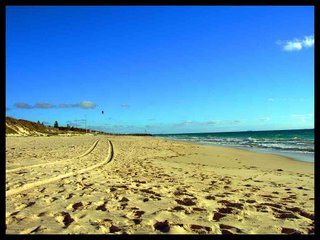 You went to the beach, and you went any time of day or night.
You went to the beach, and you went any time of day or night.
I remember long, long days sat on the beach as a child, happy to be there but bored to death as I had no friends and my mother was usually engrossed in a book and never wanted to play. I longed to be ensconced, surrounded by the water, to marvel as the tide would gently fling me along the coastline; but some days it was deemed too dangerous to swim in the sea by myself: so I sulked, resigned to sitting and baking next to my absorbed-by-other-things-far-more-interesting mother, watching the waves creep rhythmically up towards our toes, then sink further and further back into the belly of the ocean, as the day and the tides passed by.
I remember being relieved to climb into the oven-hot car, crying out as the vinyl from the seats and my red-raw thighs made contact. Wriggling uncomfortably as the sand slowly gravitated into the crutch of my bathers, and crawled into the crevices between my toes and under my nails.
Licking my salt-encrusted lips and asking if we could have fish and chips and ice cream for tea.
Memories 1
“Be careful when you swim out that way, please,” my mother warned me. “Remember what Auntie Chris told you about those rocks.”
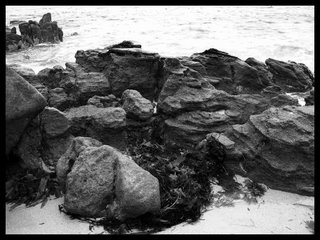 Silly to warn a kid off something. Makes it all the more interesting, and exciting, especially when it is something of a family legend. Especially when you know your mother’s eagle eyes are upon you and she’d risk her own life to ensure you kept yours away from those rocks. You’re not even allowed to see what might happen, and when you’re 12 you’re invincible and the ruling seems very unfair.
Silly to warn a kid off something. Makes it all the more interesting, and exciting, especially when it is something of a family legend. Especially when you know your mother’s eagle eyes are upon you and she’d risk her own life to ensure you kept yours away from those rocks. You’re not even allowed to see what might happen, and when you’re 12 you’re invincible and the ruling seems very unfair.
It was because of my aunt, see. When my tall, blonde and svelte Auntie Chris had just married my tall, broad-shouldered, tanned surfer Uncle Sandy, they moved to Trigg, which at the time was an outcast of Perth suburbia. Shacks now selling for over a million dollars could be snapped up for less than $25 000 in those days.
Where I lived, as a financially strapped teenager, all roads lead to the beach. The beach was the hallowed home turf of the blonde, blue-eyed surfers and their perfectly tanned, blonde, svelte girlfriends. Overly sized pale girls with freckles and a bad attitude – not really welcome, but I went anyway, because that’s what you did when you grew up in Perth.
 You went to the beach, and you went any time of day or night.
You went to the beach, and you went any time of day or night.I remember long, long days sat on the beach as a child, happy to be there but bored to death as I had no friends and my mother was usually engrossed in a book and never wanted to play. I longed to be ensconced, surrounded by the water, to marvel as the tide would gently fling me along the coastline; but some days it was deemed too dangerous to swim in the sea by myself: so I sulked, resigned to sitting and baking next to my absorbed-by-other-things-far-more-interesting mother, watching the waves creep rhythmically up towards our toes, then sink further and further back into the belly of the ocean, as the day and the tides passed by.
I remember being relieved to climb into the oven-hot car, crying out as the vinyl from the seats and my red-raw thighs made contact. Wriggling uncomfortably as the sand slowly gravitated into the crutch of my bathers, and crawled into the crevices between my toes and under my nails.
Licking my salt-encrusted lips and asking if we could have fish and chips and ice cream for tea.
Memories 1
“Be careful when you swim out that way, please,” my mother warned me. “Remember what Auntie Chris told you about those rocks.”
 Silly to warn a kid off something. Makes it all the more interesting, and exciting, especially when it is something of a family legend. Especially when you know your mother’s eagle eyes are upon you and she’d risk her own life to ensure you kept yours away from those rocks. You’re not even allowed to see what might happen, and when you’re 12 you’re invincible and the ruling seems very unfair.
Silly to warn a kid off something. Makes it all the more interesting, and exciting, especially when it is something of a family legend. Especially when you know your mother’s eagle eyes are upon you and she’d risk her own life to ensure you kept yours away from those rocks. You’re not even allowed to see what might happen, and when you’re 12 you’re invincible and the ruling seems very unfair.It was because of my aunt, see. When my tall, blonde and svelte Auntie Chris had just married my tall, broad-shouldered, tanned surfer Uncle Sandy, they moved to Trigg, which at the time was an outcast of Perth suburbia. Shacks now selling for over a million dollars could be snapped up for less than $25 000 in those days.
Sunbathing one day, she saved someone from those rocks at Trigg Beach. There’s a name for those rocks, which escapes me now.
The rocks were formed in such a way, and conspired with the tides in such a fashion, that if you made the very foolish mistake of slipping and falling into the rocks’ natural pool, complete with eddies and currents and rips, and happened to risk your life just as the surf broke over the top of the sun-bleached rocks, you’d be dragged under, get caught in the ragged and jagged barnacled rocks under the water, and never come back up. You’d never get washed out to sea, because of the rocks; you’d never surfaced, because of the rips and waves and tides.
You were a true goner. You’d get a story about you in the local paper, probably with some quotes from local lifesavers about how people should really learn not to swim around there.
But my Auntie Chris did – and saved someone else’s life. She saw a man go under, saw an arm flail madly just above the cut and thrust of the bleach-white foam, the flotsam and jetsam and without thinking about it too much raced over, jumped in as the waves receded and dragged the elderly gentleman out to safety.
The rocks were formed in such a way, and conspired with the tides in such a fashion, that if you made the very foolish mistake of slipping and falling into the rocks’ natural pool, complete with eddies and currents and rips, and happened to risk your life just as the surf broke over the top of the sun-bleached rocks, you’d be dragged under, get caught in the ragged and jagged barnacled rocks under the water, and never come back up. You’d never get washed out to sea, because of the rocks; you’d never surfaced, because of the rips and waves and tides.
You were a true goner. You’d get a story about you in the local paper, probably with some quotes from local lifesavers about how people should really learn not to swim around there.
But my Auntie Chris did – and saved someone else’s life. She saw a man go under, saw an arm flail madly just above the cut and thrust of the bleach-white foam, the flotsam and jetsam and without thinking about it too much raced over, jumped in as the waves receded and dragged the elderly gentleman out to safety.
Memories 2
I must have been about 11, I think. My uncle, the surfing bronzed one with the beautiful blonde wife, had just bought a boat; he’d studied hard and passed his skipper’s licence and
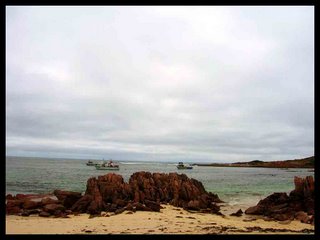 was off away up north, north to run the tugs that bring in the huge liners from overseas.
was off away up north, north to run the tugs that bring in the huge liners from overseas.And he’d promised us a turn on his boat before he left.
My mother seemed unimpressed as her younger brother put his new machine through its paces; got it to jump over swell and swirl and leave unwilling flotsam and jetsam in its wake. I remember being thrilled at the sense of motion the rhythm of the ocean was putting through my body; thought that perhaps, like my mother and her blonde, surfing, bronzed brother and their father before me, it was a life at sea for me.
That was until my uncle began steering towards shore, to dock the boat, and I, overconfident and pleased at my rapid adaptation to the rocking and lulling of the boat, no motion sickness there, good Scottish stock! took it upon myself to prove my worth and jump off on to the jetty.
I remember standing, horrified and terrified on the edge of that new boat as he missed the jetty, swung away at the last second because of the strong tide and swell, and I missed my chance to jump on to land and nearly fell in.
Before my mother had time to jump up, before I had time to come apart and have my blood freeze in my veins and fall in, my bronzed uncle’s strong arms wrapped around me and he said, ever-so quietly, “I’ve got you. Just hold still.”
I can still remember the sound of the waves lapping against the sides of that boat, all other noise washed away in my panic; never has the ocean seemed so big, so ominous, so much, much bigger and more powerful since that day. I remember thinking that saying anything
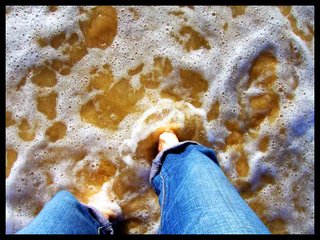 would somehow loosen my uncle’s grasp; I remember standing, frozen: dread and utter relief coursing through my veins at the touch of his reassuring, bronzed, surfing-boating arms. And weakly grabbing for the rotting wood of the jetty with such enormous, shaking reprieve.
would somehow loosen my uncle’s grasp; I remember standing, frozen: dread and utter relief coursing through my veins at the touch of his reassuring, bronzed, surfing-boating arms. And weakly grabbing for the rotting wood of the jetty with such enormous, shaking reprieve.
<< Home